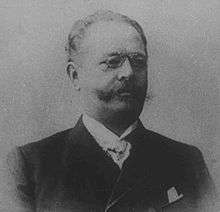Heinrich Ernst Göring
| Heinrich Ernst Göring | |
|---|---|
 | |
| Reichskommissar for German South-West Africa | |
|
In office May 1885 – August 1890 | |
| Preceded by | Gustav Nachtigal |
| Succeeded by | Louis Nels |
| Personal details | |
| Born |
31 October 1839 Emmerich, Kingdom of Prussia |
| Died |
7 December 1913 (aged 74) Munich, Kingdom of Bavaria |
| Spouse(s) | Franziska Tiefenbrunn |
| Children |
Karl-Ernst Göring Olga Therese Sophie Göring Paula Elisabeth Rosa Göring Hermann Göring Albert Göring |
Heinrich Ernst Göring (31 October 1839 – 7 December 1913) was a German jurist and diplomat who served as colonial governor of German South-West Africa. He was the father of five children including Hermann Göring, the Nazi leader and commander of the Luftwaffe.
Personal life
Göring was born in Emmerich am Rhein, the son of Wilhelm Göring (1791–1874), and his wife Caroline Maria de Neree (1815–1901). Göring married secondly Franziska Tiefenbrunn: the marriage produced five recorded children:
- Karl-Ernst Göring (born 3 August 1885 in Rosenheim; died 4 October 1932 in Hanover), jurist
- Olga Therese Sophie Göring (born 16 January 1889 in Walvis Bay (German South-West Africa); died 1970)
- Paula Elisabeth Rosa Göring (1890–1960)
- Hermann Göring (born 12 January 1893 in Rosenheim; died 15 October 1946 in Nuremberg), German politician, military leader, and leading member of the Nazi Party (NSDAP)
- Albert Göring (born 9 March 1895; died 1966 in Munich), businessman
Career
After a career as a provincial judge, the Dutch-speaking Göring was appointed Imperial Commissioner of German South-West Africa in 1885, the first German imperial commissioner, after Otto von Bismarck was forced into creating a state-financed colonial administration to support his country's fledgling Protectorate of South-West Africa.[1]
Göring's first action was to gain a 'protection treaty' with the leading Herero chief, Maharero.[2] The treaty of protection wasn't worth the paper it was written on, as Göring was in no position to offer assistance. Repeated, successful armed attacks by the Nama clan of Hendrik Witbooi proved the point. The treaty was torn up a few years later anyway by Mahrero, who also expelled Göring from Hereroland: the behaviour of the Germans had become too much and, worst of all, Göring had—perhaps unwittingly—extended his house on top of a Herero ancestral graveyard.[3] The gold rush was a hoax, however, for the purported gold deposits were nothing apart from the remains of gold pieces fired at a rock face. The identity of the hoaxer remains a mystery, but suspicion falls on Göring making a last-ditch, desperate attempt to bring investment into the protectorate, and thus save his failing mission.[4] The expected vast gold deposits started a gold rush of German settlers and investors into South-West Africa, whose behaviour further alienated the Herero. This eventually led to the Herero and Namaqua genocide. Herero skulls were eventually used by the Kaiser Wilhelm Institute of Anthropology, Human Heredity, and Eugenics, pursuing a policy of eugenics.
Notes
- ↑ Olusoga & Erichsen 2011, pp. 42–3.
- ↑ Olusoga & Erichsen 2011, p. 53.
- ↑ Olusoga & Erichsen 2011, p. 53.
- ↑ Olusoga & Erichsen 2011, p. 52.
Bibliography
- Gewald, Jan-Bart (1999), Herero Heroes: A Socio-political History of the Herero of Namibia 1890-1923, Oxford: James Currey, ISBN 0-85255-749-3
- Olusoga, David; Erichsen, Casper W (2011) [2010], The Kaiser's Holocaust: Germany's Forgotten Genocide, London: Faber and Faber, ISBN 978-0-571-23142-3
- Wellington, John H (1967), South West Africa and Its Human Issues, London: Oxford University Press